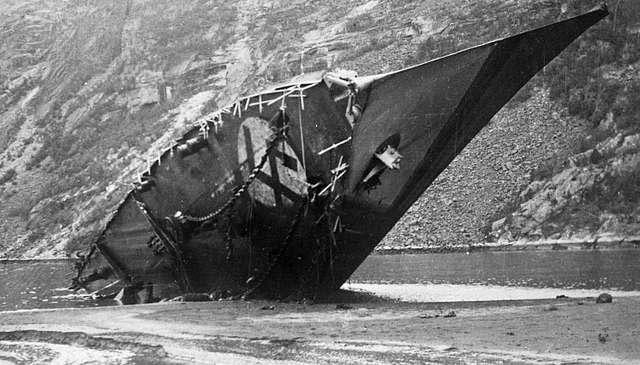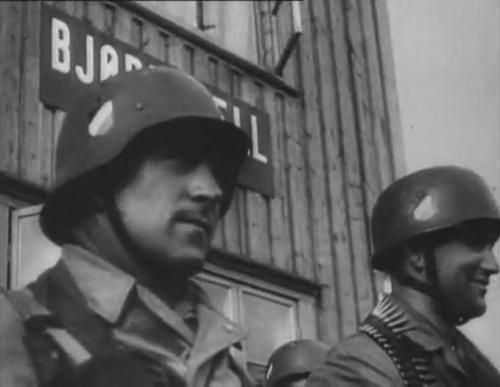Both Sides Wanted Narvik, But Only One Got It
 |
| A rare original color photograph of the German battleship Tirpitz underway in a Norwegian fjord (perhaps Altafjord) ca. 1943. |
Narvik was important to both sides for several reasons. Overall, however, it was more important to the Germans than to the Allies. The Germans prevailed because Narvik fit into their overall presence in Scandinavia more than it ever could have been of use to the British. The British basically just wanted to keep a foothold on the mainland for very vague and ill-defined purposes. Ultimately, Narvik was just too remote for the British to keep bothering with and maintaining a presence there simply wasn’t worth the effort. German control of the rest of Norway decided the issue.
 |
| a map of Narvik ca. 1940. Note that the rail line comes in from the right (east) and heads down to the Narvik port (center). The outlet to the sea is off to the left. (HISTORY OF THE SECOND WORLD WAR, The Campaign in Norway Map 9). |
I’ve been to Narvik. The basic layout hasn’t changed much since World War II. The typical entryway is via rail from Stockholm, a grueling 24-hour ride. The city is extremely isolated by public transportation. Narvik is the only town on the Ofoten rail line (
Ofotbanen) in Norway, with the closest stop being the ski resort at Riksgränsen, Sweden. If you wish to drive south, you must use ferries. If you sail, it is a long journey down the coast to the Baltic Sea. There are only about 10-12 flights a day to Harstad/Narvik Airport, all from Oslo and other Norwegian cities.
It is a rough, rugged, beautiful region with an economy that is (or at least was) based on mining. This is obvious once you get a look at the port with its giant ore-processing equipment. It is further from Berlin to Narvik than it is to Moscow, so German troops marching up Norway advanced about as far as any Wehrmacht troops during World War II.
 |
| Luftwaffe seaplanes, such as this Do 24, were vitally important in maintaining the German presence in northern Norway. You can see the shattered buildings of Narvik in the background (Federal Archive Bild 101II-MW-5618-02). |
One reason Narvik was strategically important was its location at the end of the only rail line in northern Norway from the south (as far as I know, that’s still the case). The Germans could shuttle supplies there by land through Sweden. Now, military access through Sweden was tricky and the Swedes placed a lot of conditions on transit rights, but basically, the Germans could maintain a large garrison at Narvik supplied by land rather than by risky sea convoys. The Germans worked out an accommodation with the Swedes that pretty much allowed the shipment on the line of everything but actual troops (and some of that apparently went on, too).
 |
| German destroyer Z11 Bernd von Arnim beached and scuttled in the fjord Rombaksbotn near Narvik, Norway, 13 April 1940. |
Another reason Narvik was important was all the mining that went on there (much of it in Sweden, which sold it to the Germans). Iron ore mining in the area began in 1903. The Swedes did their part to exploit the area by building their rail line to the border, while Norway finished the line the short remaining distance to the port itself. Mining company LKAB built massive mining infrastructure at the port. The port of Narvik is ice-free, making it the perfect spot to collect ore brought overland from northern Sweden and ship it to customers overseas. The Germans desperately needed natural resources, and they were always on Hitler's mind. Since they controlled southern Norway, they could ship ore down along the coast without too much interference. The Narvik ore made a lot of German tanks and ships and that alone made it of prime strategic importance for the Germans.
 |
| British ships batter Germans in Narvik in April 1940. |
A third reason Narvik was important was as a supply base for operations further north. Extreme Northern Norway was strategically important because it helped secure northern Finland, as German ships could sail around it to the line anchored at Petsamo. The fjords also were great places to park naval units that could attack the Allied Arctic convoys (such as battleship Tirpitz). At the end of the war, the Germans retreating from northern Finland withdrew into a secure defensive sector front anchored by Narvik. Since Sweden was neutral, that line protected basically the entire rest of Norway.
Perhaps most importantly, the Germans simply wanted to kick the British completely off the European mainland and secure the entire country of Norway. Adolf Hitler took a keen personal interest in the battle at Narvik, where General Dietl barely survived with his force until the British were forced to withdraw on 7 June 1940 by units marching up from the south (a very rough march). For the rest of the war, Hitler was paranoid that the British would try to invade there and kept huge garrisons in Norway. Allied reverses in France ultimately decided events at Narvik. Hitler felt that Dietl’s success at Narvik was so important that Dietl was the first soldier to receive the Oak Leaves.
 |
| The German troops at Narvik only survived in 1940 because the Luftwaffe was able to drop paratroopers to reinforce General Dietl's weak force. |
So, Narvik had great strategic importance. For the Germans, it was vital to eliminate the British presence and secure the area’s mineral and geographical advantages, while the British basically were just trying to deny the area to the Germans. The Germans ultimately prevailed because their successes on land overcame the clear British advantage at sea. However, it was a very close victory for the Germans decided more by the general war situation than by local military factors.
 |
| German troops firing at Royal Navy ships at Narvik. |
2020







